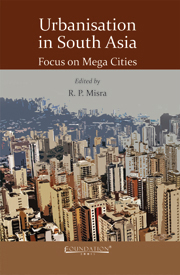Book contents
- Frontmatter
- Contents
- List of Figures
- List of Tables
- List of Contributors
- Introdution
- 1 South Asia: Land, People, and Economy
- 2 Historical Roots of South Asian Urbanisation
- 3 Mumbai: The Financial Capital of India
- 4 Delhi: Growing Problems of a Growing Megalopolis
- 5 Calcutta: The Emergence of Colonial Settlement into Megacity of the East
- 6 Chennai: A Rural Metropolis in Search of Modernity
- 7 Hyderabad: From the Feudal City to a Hi-Tech Metropolis
- 8 Bangalore: From Garden City to Silicon Valley of India
- 9 Karachi: The Commercial Capital of Pakistan
- 10 Lahore: The Cultural Heart of Pakistan
- 11 Kabul: A City in Perpetual Turmoil
- 12 Dhaka: A Mega City of Persistence and Change
- 13 Kathmandu: A City Where Tradition and Modernity Overwhelm Each Other
- 14 Thimphu: The City of Peace and Organic Development
- 15 Colombo: The Primate City of Sri Lanka
- 16 Male: Island Capital of an Island Nation
- 17 Beyond the Present: Vision of a New Urban Future
- Index
9 - Karachi: The Commercial Capital of Pakistan
Published online by Cambridge University Press: 05 September 2013
- Frontmatter
- Contents
- List of Figures
- List of Tables
- List of Contributors
- Introdution
- 1 South Asia: Land, People, and Economy
- 2 Historical Roots of South Asian Urbanisation
- 3 Mumbai: The Financial Capital of India
- 4 Delhi: Growing Problems of a Growing Megalopolis
- 5 Calcutta: The Emergence of Colonial Settlement into Megacity of the East
- 6 Chennai: A Rural Metropolis in Search of Modernity
- 7 Hyderabad: From the Feudal City to a Hi-Tech Metropolis
- 8 Bangalore: From Garden City to Silicon Valley of India
- 9 Karachi: The Commercial Capital of Pakistan
- 10 Lahore: The Cultural Heart of Pakistan
- 11 Kabul: A City in Perpetual Turmoil
- 12 Dhaka: A Mega City of Persistence and Change
- 13 Kathmandu: A City Where Tradition and Modernity Overwhelm Each Other
- 14 Thimphu: The City of Peace and Organic Development
- 15 Colombo: The Primate City of Sri Lanka
- 16 Male: Island Capital of an Island Nation
- 17 Beyond the Present: Vision of a New Urban Future
- Index
Summary
Karachi, a fishing village in the eighteenth century, has grown into a wonderful Mega City of the twenty-first century. It has been referred to as the ‘Glory of the East’, ‘City of Lights’, and the ‘Liverpool of India and Pakistan’. It had the distinction of having the first airport and the third seaport of undivided India. It was the Federal Capital of Pakistan from 1947 to 1961 and now constitutes the biggest commercial hub of the country. Together with Bin Qasim port just 50 km from the city centre, it accounts for more than 95 per cent of Pakistan's foreign trade, 30 per cent of its industrial production, and 60 per cent of the total revenue.
Karachi is the home of almost 15 million people. Despite the fact that it generates huge revenues for the country, its residents are deprived of the basic civic amenities. ‘Unmanaged growth of the city has given rise to the mushrooming of Katchi Abadies (slums and squatter settlements), where poverty, disease, and crime’ prevail. It is the most literate cities of Pakistan, but most of its residents have so far failed to enjoy a quality of life that they deserve, given the prime role Karachi plays in the economy of Pakistan.
- Type
- Chapter
- Information
- Urbanisation in South AsiaFocus on Mega Cities, pp. 252 - 283Publisher: Foundation BooksPrint publication year: 2012
- 1
- Cited by



